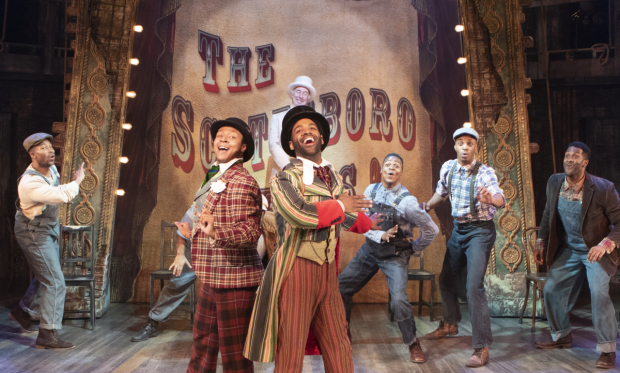Justice Is on Trial in The Scottsboro Boys

(© Christopher Mueller)
Signature Theatre can now add to its list of accomplishments a rousing Washington, DC, premiere of The Scottsboro Boys, John Kander and Fred Ebb's 2010 work that improbably turned a Depression-era scandal into a vibrant, socially impactful musical.
With book by David Thompson and music and lyrics by Kander and Ebb, The Scottsboro Boys tells the story of a massive miscarriage of justice that began on March 25, 1931, on a freight train traveling from Chattanooga to Memphis, Tennessee. The train was full of young men and women leaving home in search of work.
When a fight on the train broke out between two groups of black people and white people, nine black teenagers and two white women were arrested and taken off the train. The women accused the boys of rape. The boys went to the nearest jail, in Scottsboro, Alabama. The first trial lasted one day.
By 1937, the four youngest boys were freed. The rest endured eight trials. The remaining five boys were continually found guilty by biased all-white juries, despite being defended by a well-known New York lawyer, Samuel Leibowitz, and having garnered national support for their case.
Directed by Joe Calarco, Signature heightens the inherent insult in this event and re-creates the atmosphere of bizarre fantasy that grew up around it by telling the story as if it is a minstrel show, the 19th century form of theater where whites performed in blackface. In this show, all the performers except the Interlocutor (Christopher Bloch) are African-American. Even the two white women, Victoria Price and Ruby Bates, are played by two of the Scottsboro boys.
While The Scottsboro Boys doesn't dig deeply into the lives of each of the boys, their personalities are clearly etched as they announce what they were doing on the train: One was going to make money for his mother; another was looking for work.
The most prominent figure in this group is Haywood Patterson (Lamont Walker II), who was 18 when arrested and refused to admit to a crime he didn't commit. Walker is excellent in this role, whether singing with his fellow cellmates ("Commencing in Chattanooga") or alone ("Nothin'"). C.K. Edwards plays the youngest boy, Roy Wright, who was only 12 when he was released from prison.
As Andy Wright, Jonathan Adriel makes clear the pain he feels when he learns that he will not be released from prison with his brother, Roy. Malik Akil is brilliant as both Charles Weems and Victoria Price, the white woman who testified against the boys. DeWitt Fleming Jr. excels as Ozie Powell and as the other white woman, Ruby Bates, who eventually recanted her accusation.
Stephen Scott Wormley is a knockout as Mr. Bones in the minstrel show, as well as a slow-moving, senile prosecutor in the first trial. Chaz Alexander Coffin is spectacular as Leibowitz, particularly in "That's Not the Way We Do Things."
The choreography by Jared Grimes is woven neatly into the narrative, with much of the story demonstrated by dance. Set designer Daniel Conway creates a huge gray stone backdrop with a steel door, a continual reminder that the boys are in prison. A movable arch, with spotlights attached, is used for the minstrel show moments. Costume designer Emilio Sosa dresses the boys in jeans and overalls when they ride on the train, white pants and shirts while in jail, and tuxedos and white lipstick when they appear at the end.
In the hands of lesser creators and actors, The Scottsboro Boys could become an over-the-top rant about the ignorance of Southerners in the 1930s. As envisioned by Calarco and his team, however, there is not a mawkish or self-indulgent moment to be found. Kander and Ebb's musical offers a stunning reminder of how easily in America justice can be forgotten and freedom denied.











